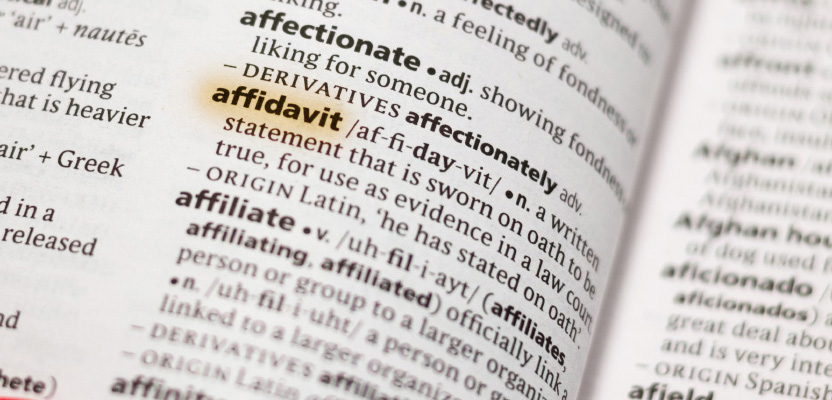What is an affidavit in the UK?
An affidavit is a written statement of facts that has been sworn by oath or affirmed to be true.
In the UK, an affidavit must be sworn or affirmed in the presence of a Commissioner for Oaths - most commonly a solicitor or a notary public.
Affidavits are often used in court proceedings as additional evidence in conjunction with witness statements. For someone with evidence to present, swearing an affidavit may be more practical than appearing as a witness in court.
The meaning of the word affidavit is 'he has sworn' - the third person singular of the Latin verb affidare.
If you make an affidavit, you are said to 'offer' it, even though a court might compel you to swear one.
An affidavit is also known as a sworn statement, a statement under oath or a notarised statement.
Who can offer an affidavit?
Anyone who has sufficient mental capacity to understand the implications of making this type of oath can make affidavit.
Sometimes, where somebody lacks mental capacity, an affidavit can be offered on their behalf. However this is relatively uncommon.
The Commissioner for Oaths should also check legal capacity. For example, that if the person offering the affidavit does so on behalf of a company, the person is a director or someone with appropriate authority to do so.
What is in an affidavit?
The text of an affidavit is a record of the knowledge and beliefs of the person offering it. Because the content could contain personal opinion rather than fact, and because some facts could be omitted either because they have been forgotten, or because the individual was not aware of them, you are not accountable for failing to include information of which you are not aware.
In what circumstances could an affidavit be used?
In the UK, affidavits are most commonly used in litigation - any dispute that is taken before a court.
For example, they are used in:
- divorce proceedings and family law proceedings
- disputes over inheritance or ownership of property
- disputes over debts and debt cases, such as when a statutory demand is made
However, since the Civil Procedure Rules came into force, witness statements are increasingly replacing affidavits.
The main difference between a witness statement and an affidavit is that an affidavit contains a jurat- a statement of when, where, and before whom it was sworn - whereas the former contains a statement of truth.
Occasionally an embassy or a consulate may ask you to provide a sworn affidavit, for example, to clarify your identity or circumstances.
Writing an affidavit
If, during legal proceedings, you are required to offer an affidavit, the court will give you instructions on how to file a statement and a deadline by which you must do so.
If you knowingly make a false statement in an affidavit, then you are in contempt of court. If you are found out by the court, you can be punished.
Because of this, when completing an affidavit you must be very careful that you set out the facts or your account of the events accurately. We advise that you re-read your statement once you have written it to make sure that it is complete and true. If there are any errors, you must change them before you swear an oath, regardless of the consequences or inconvenience to others of correcting them.
Execution of an affidavit
Usually an affidavit is signed in front of a solicitor, notary public, judicial officer, another officer of the court or someone else who is commissioned to receive oaths.
In most cases, an affidavit is sworn with a signature acting as a record of that swearing.
The witness - the person authorised to administer oaths - confirms that the person making the oath and signing the document is the person indeed who has been recorded as offering the affidavit.
Solicitors usually charge a fee for witnessing and swearing the statement. If the affidavit is made at court, then there is no cost.
Related documents
In the UK, court form N285 is used to offer an affidavit. Effectively, it is an affidavit template. But technically, you don't have to use this form to make an affidavit. It is simply the presentation that a court expects to be used.
A statutory declaration (or stat dec) tends to be used when what is being declared as truth is a belief or an opinion, or an action taken in good faith. They are often used in disputes where the truth is difficult to ascertain or where personal opinions are sought. They differ from affidavits in that they are declared, not sworn. Like an affidavit, they must be signed in front of someone who can administer oaths.

